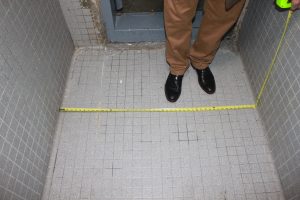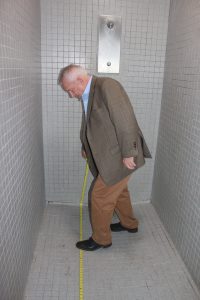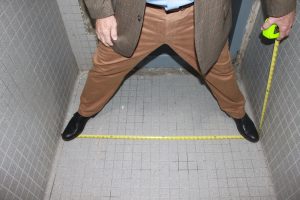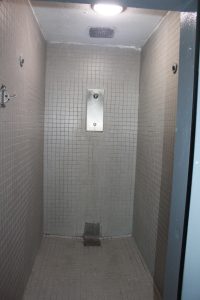Last week, Judge Marc Treadwell, United States District Court Judge for the Middle District of Georgia, held several officers of the Georgia Department of Corrections in contempt of court for failing to correct numerous violations of the Federal and Constitutional rights of Georgia inmates who are housed in solitary confinement in Georgia Prisons. In his 100 page Order, Judge Treadwell threatened them with fines and ordered an independent monitor to ensure compliance with a settlement agreement for the Special Management Unit of the Georgia Diagnostic and Classification Prison in Jackson, about 50 miles south of Atlanta. In its Order, the Court found that prison officials falsified documents and said they routinely placed new arrivals at the facility in “strip cells,” where one inmate said he was not given clothes or a mattress and could not use the toilet because it was broken and filled with human waste.
A psychology professor and prison expert, Craig Haney, Ph.D., J.D., told the court back in 2018 he had toured maximum security prisons in roughly two dozen states, and Georgia’s SMU unit was “one of the harshest and most draconian” he had seen. His report, submitted to the court in 2018 by lawyers for prisoners — included images of prisoners with self-inflicted cuts, blood on the floor of one cell and the window of another, and descriptions of “extraordinarily harsh” living conditions. His conclusion: “The prisoners at this facility face a substantial risk of serious harm, harm that may be long-lasting and even fatal.” Southern Center for Human Rights attorney Sarah Geraghty, who represented the prisoners, said in a news release back in 2018 when the initial agreement was reached“A civilized society doesn’t lock people in isolation cells for years on end,” she said. “It was past time to move out of the dark ages.”
These solitary confinement cells at the heart of this Contempt Order measure 7 feet X 13.5 feet, and contain a toilet and mattress. Inmates housed in these solitary confinement cells receive their meals through a slit in a solid door that has a small window at the top. You may think the photograph at the top of this blog post is of one of these solitary confinement cells that have been ruled to be inhumane. But you would be wrong. That’s because this photograph is of a shower stall in Smith State Prison in Glennville, Georgia, where my client was held for nearly three days and where, ultimately he hanged himself, resulting in his death. The shower stall measures only 3.75 feet X 6.75 feet, which makes the Georgia solitary confinement cells practically Ritz Carlton luxury in comparison. Also, as you can see, there was certainly no mattress in the shower stall, nor toilet where my client could relieve himself for three days. No ventilation, no heat, no cup of water. Just imagine. Housing an inmate in a shower violates Georgia Department of Corrections’ Standard Operating Procedures. So does falsifying cell counts so it looks as if an inmate is in his cell when he is actually physically being illegally detained in a shower stall. 


Unbelievably, there is actually a Georgia Federal District Court opinion that inexplicably held that detention in a shower without a toilet, without ventilation, without a mattress, if just for one day, does not constitute cruel and unusual treatment in violation of the 8th Amendment. In Stokes v. Johnson, CV621-011, 2023 WL 2787980, at 4 (S.D. Ga. Apr. 4, 2023) the District Court for the Southern District of Georgia, the Hon. Christopher Ray, held:
There is no constitutional requirement for access to a working toilet. Indeed, courts within the Eleventh Circuit have repeatedly refused to find Eighth Amendment violations based on short term unavailability of traditional toilets with or without ideal water pressure, or even exposure to overflowing toilets. See, e.g., Alfred v. Bryant, 378 F. App’x 977, 980 (11th Cir. 2010) (affirming dismissal of Eighth Amendment claim based on confinement in cell for eighteen days without properly functioning toilet); Anderson v. Chapman, 2013 WL 4495827, at *4-*6 (M.D. Ga. Aug. 20, 2013) (granting defendants summary judgment where prisoner alleged placement on suicide watch for five days with no access to clothing, mattress, blanket, toilet paper, water or showers, and forced sleeping on floor with dried urine, blood and feces), aff’d, 604 F. App’x 810, 814 (11th Cir. 2015); Dixon v. Toole, 2006 WL 1038433, at *5 (S.D. Ga. Apr. 13, 2006) (finding no Eighth Amendment violation for suicide watch cell at Webster Detention Center, including hole in floor for toilet), aff’d, 225 F. App’x 797, 799 (11th Cir. 2007). As the conditions described by Plaintiff were experienced for a relatively short time, they do not appear sufficiently “extreme,” and thus fail to implicate the Eighth Amendment’s prohibition on cruel and unusual punishment.
Many other states are now reconsidering solitary confinement. For example, the Chicago Lawyers’ Committee for Civil Rights has called the use of solitary confinement — also called segregation or restrictive housing — in Illinois a violation of international human rights laws. Their report calls for reducing or restricting its use, saying that would improve prison safety and inmates’ health, limit costs and help cut down on recidivism. The Isolated Confinement Restriction Act, which has been proposed in the Illinois General Assembly, would mandate inmates not be held in solitary confinement for more than 10 consecutive days in any 180-day period. It also would require that, while they’re out of their cells, they be given access to activities like classes, showers, the prison yard, medical appointments and the dining hall. On April 15, U.S. Sen. Dick Durbin, D- Ill., introduced legislation to limit the use of solitary confinement by the federal Bureau of Prisons and in U.S. Marshals Service detention facilities “to the briefest term and under the least restrictive conditions possible because the overuse of solitary confinement threatens public safety, strains prison budgets and violates fundamental human rights.” But if we agree that solitary confinement is simply inhumane, neither of these proposed laws goes far enough. And Georgia isn’t even close to having any sort of law restricting solitary confinement.
There is no question that scientific data proves that placing someone in solitary confinement increases the risk of suicide. This is well known in the corrections industry. It is not news. The National Commission on Correctional Health Care Standard P-B-05 makes it clear that the “admittance to segregation or single-cell housing” creates a high-risk time for inmate suicide. The NCCHC Standards don’t even bother mention housing an inmate in a shower stall, supposedly because that would be out of the question. But not in a Georgia prison.
In my handling of inmate suicide cases, I have always argued that if you wouldn’t do that to a dog, you shouldn’t do that to a human being. Our very decency as humans demands this. Our sense of morality requires this. Eliminating solitary confinement and eliminating the illegal housing of inmates in a shower stall must happen.
Robin Frazer Clark is a trial lawyer who pursues justice for those who have personal injury claims as a result of being injured in motor vehicle wrecks, trucking wrecks, defective products, defective maintenance of roads, premises safety, medical malpractice and other incidents caused by the negligence of others. Ms. Clark is the 50th President of the State Bar of Georgia, a Past President of Georgia Trial Lawyers Association, a Past President of the Lawyers Club of Atlanta and has practiced law in Georgia for 36 years. She is a member of the International Society of Barristers and of the American Board of Trial Advocates. She is a Fellow of the American College of Trial Lawyers. Mrs. Clark is listed as one of the Top 50 Women Trial Lawyers in Georgia and the Top 25 National Women Trial Lawyers and is a Georgia Super Lawyer. Ms. Clark is the co-host of the podcast “See You In Court,” sponsored by the Georgia Civil Justice Foundation. Ms. Clark has tried over 75 jury trials and argued in Georgia Appellate Courts over 45 times.
Robin Frazer Clark ~ Dedicated to the Constitution’s Promise of Justice for All.
 Atlanta Injury Lawyer Blog
Atlanta Injury Lawyer Blog













